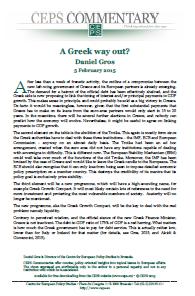Katsanidou, A. & Otjes, S. (2015) “Mapping the Greek party system after the 2015 elections: how the economy and Europe have merged into a single issue“, LSE EUROPP, 25 February. The Greek government is still attempting to negotiate a long-term solution to the country’s debt problem, but what are the lasting implications of the 2015 Greek parliamentary elections for politics in Greece? Alexia Katsanidou and Simon Otjes present a …Read More
Reading The Greek Deal Correctly
Galbraith, J. (2015) “Reading The Greek Deal Correctly“, Social Europe Journal, 23 February. On Friday as news of the Brussels deal came through, Germany claimed victory and it is no surprise that most of the working press bought the claim. They have high authorities to quote and to rely on. Thus from London The Independent reported: several analysts agreed that the results of the talks amounted to a humiliating …Read More
What Germany Owes Greece
Crook, C. (2015) “What Germany Owes Greece“, BloombergView, 19 February. How much does it matter, if at all, that Greece’s demand for a new bailout program with softer terms is being pressed by a new government, elected for that very purpose — a government that retains solid support even as its standoff with other European Union governments drags on? How much does democracy matter in a situation like this? …Read More
Who’s Extorting Whom? It’s All About Coercion
Weisbrot, M. (2015) “Who’s Extorting Whom? It’s All About Coercion“, The Huffington Post, 17 February. The Economist‘s Feb. 6 cover displayed the Venus de Milo statue pointing a revolver, with the headline “Go ahead, Angela, make my day.” In the editors’ upside-down world, Greece is threatening Europe, or at least Germany. Really? On Monday, Feb. 16, European officials “handed Athens an ultimatum: Agree by Friday to continue with a …Read More
Folder on the negotiations of Greece in the Eurogroup
The Ministry of Finance of Greece was published a folder that includes the presentations of the Greek Finance Minister, Y. Varoufakis, before his counterparts during the Eurogroup meetings of the 11th and 16th of February 2015. The folder includes the documentation non papers provided by the negotiating team, as well as the draft proposals for Greece by the Head of the Eurogroup, J. Dijsselbloem, and the European Commissioner for Economic …Read More
Greece, Its International Creditors and the Euro
Sabri Öncü, T. (2015) “Greece, Its International Creditors and the Euro“, Naked Capitalism Blog, 17 February. Yves here. This is an excellent background piece on how Greece got where it is and how its various bailouts were structured. It also helps explain the past and current roles the various members of the Troika play and discusses the prospects for Greece achieving its aims. By T ([email protected]), a financial economist …Read More
The radicalisation of lower middle class Greek families was the key to Syriza’s victory
Leonitsis, V. (2015) “The radicalisation of lower middle class Greek families was the key to Syriza’s victory, LSE EUROPP, 13 February. A number of commentators have written on the extent to which Syriza managed to attract the backing of a wide section of Greek society in its election victory on 25 January. Vasilis Leontitsis writes that one of the key dynamics in the election was the support Syriza received …Read More
Greece: ECB Kicks Syriza in the Face; Syriza Turns the Other Cheek
Weisbrot, M. (2015) “Greece: ECB Kicks Syriza in the Face; Syriza Turns the Other Cheek“, The Huffington Post, 05 February. On Wednesday the European Central Bank (ECB) announced that it would no longer accept Greek government bonds and government-guaranteed debt as collateral. Although Greece would still be eligible for other, emergency lending from the Central Bank, the immediate effect of the announcement was to raise Greek borrowing costs and …Read More
Je suis Dijsselbloem ou Varoufakis?
Χατζησταύρου, Φ. (2015) “Je suis Dijsselbloem ou Varoufakis?“, Protagon Website, 04 February. Η πρώτη συνάντηση Βαρουφάκη-Ντάισελμπλουμ φέρνει στη δημόσια συζήτηση ένα θέμα που μέχρι τώρα ήταν αντικείμενο ανάλυσης κυρίως των ενασχολούντων με τη θεσμική λειτουργία της ΕΕ στα οικονομικά θέματα. Ευκαιρία, λοιπόν, να δούμε ποιο είναι το πρόβλημα, γιατί υπάρχει πρόβλημα, και ποιες οι συνέπειές του μέχρι σήμερα. Από το 2010 και μετά οι ευρωπαϊκές κυβερνήσεις ομόφωνα προχώρησαν στην …Read More
A Greek Way Out?
Gros, D. (2015) “A Greek Way Out?“, Economic Policy: Commentaries, Centre for European Policy Studies, 05 February. In his analysis of the basic compromise that is emerging between the new left-wing government of Greece and its European partners, Daniel Gros emphasises that the key element will be how the real problem, namely liquidity, is dealt with. Relevant posts: Stockman, D. (2015) “History In the Balance: Why Greece Must …Read More






